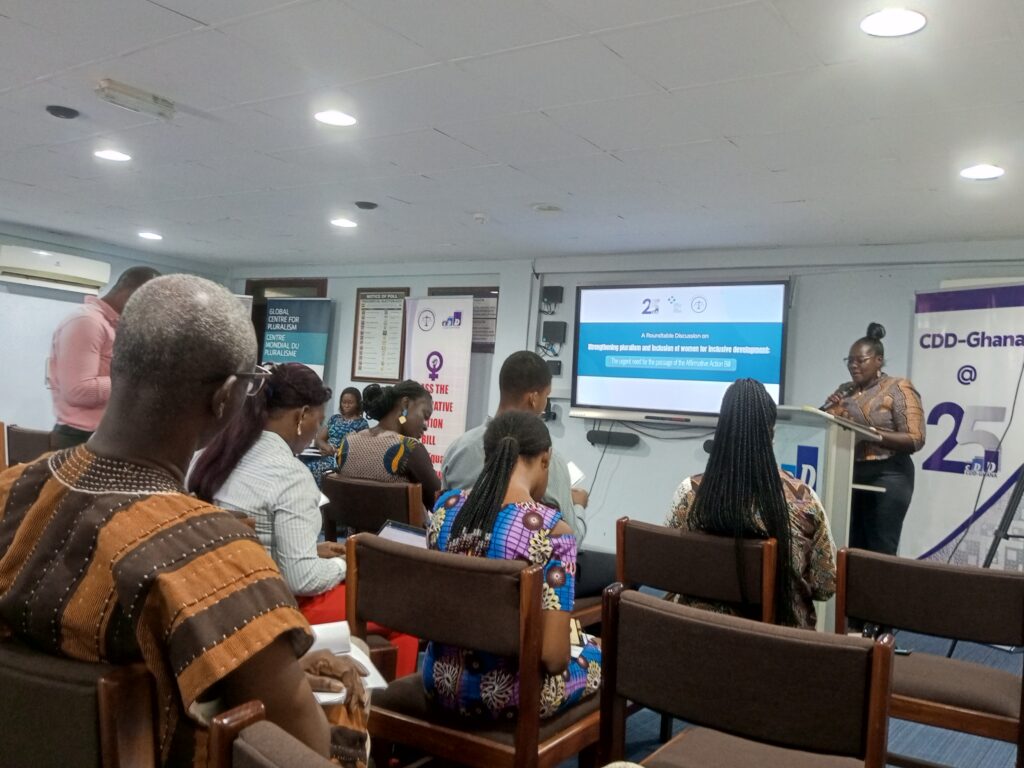CDD-Ghana underscores need for passage of Affirmative Action Bill

The Ghana Centre for Democratic Development (CDD-Ghana) has underscored the need for the government to fast track the passage of the Affirmative Action Bill into law.
The Bill, which seeks to promote women’s participation and representation in decision-making spaces, has been on the shelves for over a decade without seeing the light of day.
Mrs Regina Amanfo Tetteh, Team Lead for Human Rights and Inclusion, CDD-Ghana, said the enactment of the Bill would be a step in the right direction, as its aim would be to address the historical social, cultural, economic, and political gender imbalance in the country and serve as a tool for justice for women in the country.
She made the call at a roundtable organised by CDD-Ghana on “Strengthening Pluralism and Inclusion of Women for Inclusive Development: The Urgent Need for the Passage of the Affirmative Action Bill into Law”.
The event was organised by the Centre in collaboration with the Global Centre for Pluralism and the Affirmative Action Coalition.
“There is the hope that passing this Bill and creating a more inclusive environment for both women and other marginalised groups will also connect with the young people, and they will no longer feel limited or restricted to participate in the development of this country,” Mrs Tetteh stated.
She urged key stakeholders, especially the Ministry of Gender, Children and Social Protection to do their best to push for the passage of the Bill.
She reiterated that throughout the world, several efforts had been made to address the problem of inclusion and the exclusion of other marginalised groups in society.
Mrs Tetteh said this had been seen in legal systems, public policy frameworks and the signing of so many international and regional charters and treaties by all countries focused on ensuring inclusive governance and development.
She said while some progress had been made and women had broken the glass ceiling in varied fields of life, gender inequality and exclusion of women were still extensive, and inequality was still pervasive, and women and girls remain disproportionately discriminated against across social, economic, and public life.
She noted that this was a barrier to sustainable development as highlighted by the inclusion of a stand-alone Sustainable Development Goal that aims to achieve gender equality and empower all women and girls.
She reiterated CDD-Ghana’s commitment to the advocacy to get the Affirmative Action Bill passed into law.
“In order for Ghana to achieve this goal of becoming a more inclusive state with equal opportunities for all, it is very important and urgent to address its human rights gaps; one of the human rights violations is the continuing gender imbalance within various spheres of life.”
She said in the most recent Global Gender Gap Report published in December 2019, Ghana was ranked 107 out of 152 countries for the gender index on political empowerment, with a score of a mere 0.129, compared with 0.563 for Rwanda, 0.497 for South Africa, 0.427 for Ethiopia, 0.309 for Uganda and 0.238 for Zimbabwe.
She said the Global Centre for Pluralism Monitor Assessment report had come at the right time because again it was stressing the urgent need for Ghana to pass the Affirmative Action Bill into law to ensure that women were part of the decision-making process of policies to ensure inclusive development.
Mrs Tetteh said CDD-Ghana aims through the Coalition to push for the introduction and passage of the Affirmative Action Bill because it aligns with the mission and vision of the Centre.
She said women’s political representation in Ghana had been abysmal, and that women hold only 40 seats of the 275 members in Ghana’s current Parliament, which represents only 14.5 per cent of the total Parliament.
This, she said was far below that of the African average of 24 per cent.
She said the situation was even worse at the local government level where the barrier to participation is supposed to be lower; declaring that “out of the 6,000 or so assemblies’ members across the country, only 216 are women”.
Madam Faustina Acheampong, Director of Gender, Ministry of Gender, Children and Social Protection, said in March this year, the Affirmative Action Bill was resubmitted to Cabinet for consideration and onward submission to Parliament.
Dr Esi Kyere Mensah, Senior Lecturer, Department of Management and Human Resources, Ghana Communications University, in a virtual presentation said the inability of Ghana to pass the Affirmative Action Bill into law was problematic, which signals that more advocacy was needed.
Mrs Sheila Minka-Premo, Convener, Affirmative Action Bill Coalition, urged all stakeholders to support the Coalition in its efforts to get the Bill passed into law.
Source: GNA
